Good tools don’t necessarily look different than bad tools at first glance. Hands-on experience is the only way to tell the difference, and here’s my latest pick of tools from three different brands that have proven their worth through experience. Most are new enough that you probably haven’t used them before. All else being equal they can help you get more done in a day and put more money in your pocket.
Paslode CF325
There are three reasons I like this hose-free framing nailer:
- The lightweight, angled, compact design fits into very tight spaces (even between 16” o.c. studs and trusses)
- The 50,000 shot cleaning interval reduces maintenance chores
- The nose piece is easier to push than any other gas nailer I’ve used, both for head-on work and toenailing
This is a stealth tool, measuring just 12” from front-to-back, and 14 3/8” top to bottom. At 7 lbs. 12 oz / 3520 grams measured on my scale (ready to fire) it’s also about a pound lighter than the air-powered framing nailers I own. Unlike previous generations of gas nailers, the fuel canister just drops in, with no need to carefully align outlet fittings. Canadian street price: $529
- Pro:
- exceptionally compact, light-weight hoseless performance
- Con:
- like all gas nailers, fuel cartridges have maximum 21 month shelf life
Paslode 18 gauge brad nailer
This tool shoots the smallest diameter fasteners in the Paslode hose-free line-up, it’s also light and easy to hold (4 lbs. 15 oz / 2240 grams ready to fire), and has worked reliably in every situation I’ve tackled. Although this nailer can’t bump fire like air-powered finishers, I don’t consider this an issue for trim installation. Unlike some other gas brad nailers on the market, this model uses easy-to-find straight strips of brads. Street price: $389
- Pro:
- hose-free operation is easier than dragging a hose and compressor through the house
- Con:
- opening and closing gas cartridge door takes a bit of getting used to
Paslode 16 gauge finishing nailer
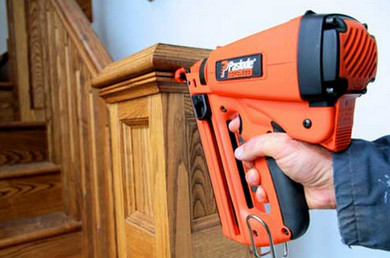 Firing 16 gauge finishing nails gives you an extra 1/2” of length over the maximum 2” nails that fit 18 gauge models, but what’s the point if the gun can’t sink the nails? I know from tool testing that many non-gas cordless finishing nailers can’t drive long nails all the way into hardwood. This model has plenty of power for times like these, and weighs only 1 lbs more than the lightest air-powered 16 gauge finishing nailer in my collection. The Paslode 16 gauge weighs the same as their 18 gauge brad nailer. Street price: $399
Firing 16 gauge finishing nails gives you an extra 1/2” of length over the maximum 2” nails that fit 18 gauge models, but what’s the point if the gun can’t sink the nails? I know from tool testing that many non-gas cordless finishing nailers can’t drive long nails all the way into hardwood. This model has plenty of power for times like these, and weighs only 1 lbs more than the lightest air-powered 16 gauge finishing nailer in my collection. The Paslode 16 gauge weighs the same as their 18 gauge brad nailer. Street price: $399
- Pro:
- more driving power than competitive, non-gas cordless 16 gauge finishing nailers
- Con:
- like all gas nailers, requires periodic cleaning
Milwaukee ProPex Expander
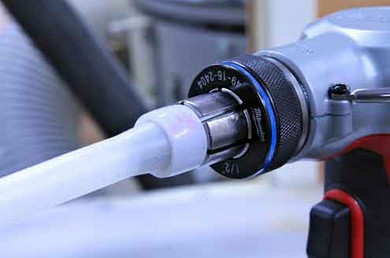 This 12-volt cordless tool offers the fastest and most idiot-proof method I’ve seen so far for completing connections in PEXa pipe. The expander works with two other fittings in addition to the pipe itself:
This 12-volt cordless tool offers the fastest and most idiot-proof method I’ve seen so far for completing connections in PEXa pipe. The expander works with two other fittings in addition to the pipe itself:
- barbed plastic or metal fittings (tees, elbows, nipples, etc)
- a joint ring
Slip the joint ring over the end of the pipe, then put the fingers of the expander in the end of the pipe. Switch it on and the fingers open and close while also rotating about 1/8 of a turn with each cycle. The fingers stretch the pipe and ring large enough to accept the end of the barbed fitting, and the pipe stays larger for several seconds. Remove the expander, slip the fitting into the pipe, then hold it there for a few seconds. You’re water tight in less than a minute as the pipe and ring shrink down over the fitting. The 12-volt expander handles PEX from 3/8” to 1” (comes stock with heads for 1/2”, 3/4” and 1” pipe). An 18-volt model is available for pipe from 3/8” to 1 1/2” (comes stock with heads for 1”, 1 1/4” and 1 1/2”). Street price: $499 for the 12-volt; $849 for the 18-volt
- Pro:
- high productivity with reliable PEX connections
- Con:
- requires use of PEXa pipe and specific fittings
Milwaukee No-Hub Driver
A no-hub connector is a type of clamp-tightened plumbing fitting used to connect drain pipes, and in order to meet code the screw clamps must be tightened to either 60 or 80 inch/lbs, depending on the connector. Until now this meant maintaining a set of calibrated torque wrenches, but there’s a faster option. Milwaukee’s unique cordless 12-volt no-hub driver is calibrated to tighten the screw clamps to exactly 60 or 80-inch pounds, depending on what’s required. The tool is supposed to check itself for accuracy during use, alerting you when recalibration is required. The manufacturer claims 25,000 installations before recalibration is needed, but even if the service interval is only half that long, that’s still a lot of connections. The tools also drives regular deck screws. Street price: $299
- Pro:
- greater productivity than torque wrenches
- Con:
- you’ve got to buy the tool
Milwaukee PVC Shears
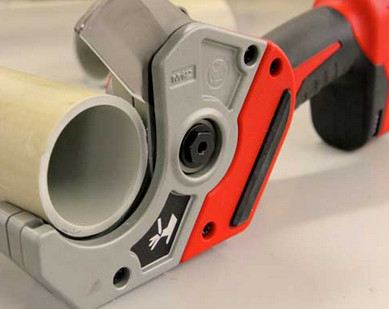
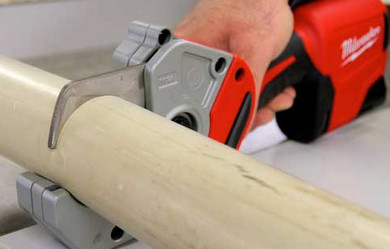 Besides speed (it’s easy to cut a piece of 1”diameter PVC conduit every 5 seconds), the beauty of this tool is that it lets you cut, fit and assemble conduit without getting down from a ladder. There’s no need to saw anything. The sheared edge is also glass-smooth and burr-free. Although this tool can’t cut PVC central vac pipe (it’s too flexible), these shears worked perfectly during my tests on black poly water pipe, PEX, PEX-AL-PEX and even 2” diameter ABS. Uses the same 12 volt lithium-ion battery as all sub-compact Milwaukee cordless tools. Street price: $199
Besides speed (it’s easy to cut a piece of 1”diameter PVC conduit every 5 seconds), the beauty of this tool is that it lets you cut, fit and assemble conduit without getting down from a ladder. There’s no need to saw anything. The sheared edge is also glass-smooth and burr-free. Although this tool can’t cut PVC central vac pipe (it’s too flexible), these shears worked perfectly during my tests on black poly water pipe, PEX, PEX-AL-PEX and even 2” diameter ABS. Uses the same 12 volt lithium-ion battery as all sub-compact Milwaukee cordless tools. Street price: $199
- Pro:
- much greater efficiency than handsaw or chopsaw
- Con:
- watch your fingers!
Stanley MIG15 Hammer
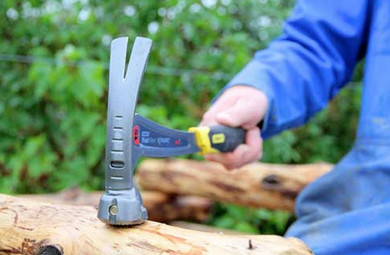 The tag on this 15 ounce steel hammer claims that it hits as hard as a 28 ounce framer, and while I can’t see how any hammer can supersede the laws of motion, inertia and physics, the MIG15 is still a pretty good hammer all the same. It’s lighter than traditional framers, but that makes sense these days. I don’t know any builder who drives the bulk of their nails by hand any more, and that’s why framing hammers have become more of a supplemental tool than a workhorse. So why carry and swing a big bruiser when you don’t need to? The MIG15’s got a high-friction, hatchet-style grip and a nail-starting slot and magnet on top. It feels good when you swing it and the points of the serrated face are sharp enough to actually make a difference. Street price: $90
The tag on this 15 ounce steel hammer claims that it hits as hard as a 28 ounce framer, and while I can’t see how any hammer can supersede the laws of motion, inertia and physics, the MIG15 is still a pretty good hammer all the same. It’s lighter than traditional framers, but that makes sense these days. I don’t know any builder who drives the bulk of their nails by hand any more, and that’s why framing hammers have become more of a supplemental tool than a workhorse. So why carry and swing a big bruiser when you don’t need to? The MIG15’s got a high-friction, hatchet-style grip and a nail-starting slot and magnet on top. It feels good when you swing it and the points of the serrated face are sharp enough to actually make a difference. Street price: $90
- Pro:
- light weight, inviting grip, reasonable price
- Con:
- metal body not designed for levering nails out sideways
BOSTITCH N62FNK-2 Nailer
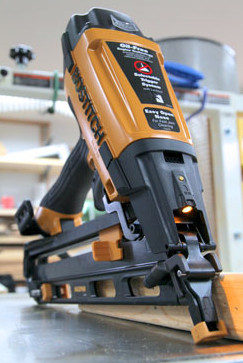 This 15 gauge air nailer has five features that I’ve never seen in other finishing nailers. First, it operates without need for oil, so there’s no chance of staining raw wood. It also has an on-board LED light to illuminate dark work areas, a button-activated blower to clear sawdust, and a swiveling 16” long gauge to find studs from one nail to the next. The N62FNK-2 also comes with four interchangeable nose tips that make it easy to sink nails into just the right spot in bead board, cove, tongue & groove, and 5/16” in from a square edge. This tool is also quite light, weighing in at 4 lbs. 3 oz or 1890 grams on my scale. Street price: $229
This 15 gauge air nailer has five features that I’ve never seen in other finishing nailers. First, it operates without need for oil, so there’s no chance of staining raw wood. It also has an on-board LED light to illuminate dark work areas, a button-activated blower to clear sawdust, and a swiveling 16” long gauge to find studs from one nail to the next. The N62FNK-2 also comes with four interchangeable nose tips that make it easy to sink nails into just the right spot in bead board, cove, tongue & groove, and 5/16” in from a square edge. This tool is also quite light, weighing in at 4 lbs. 3 oz or 1890 grams on my scale. Street price: $229
- Pro:
- lots of useful, innovative features
- Con:
- some plastic parts might break with use
DeWALT DWX723
I’ve been using the earlier version of this stand – the DW723 – since 2001 with great results, and the revised DWX723 solves a few minor problems with the original design. The angled legs lock rigidly enough when open to create an exceptionally solid stance, and the support arms extend horizontally to offer more than 12 feet of total support for wood. Flip-up tops on the end supports swivel upwards to create stops for cutting multiple parts to identical length without measuring. The DWX723 fits most brands of saws, and the rubber feet are secured with screws, eliminating the perennial problem of lost feet on the original design. Street price: $229
- Pros:
- exceptionally solid performance; lumber supports flip up to act as length stop
- Cons:
- some saws easier to remove from stand than others
This article originally appeared in Canadian Contractor in July, 2011.